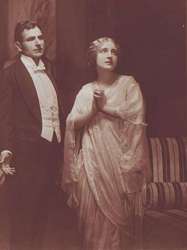The Man in the Mirror is a film of genre Drama directed by Robert Wiene with Maria Fein
The Man in the Mirror (1916)

If you like this film, let us know!
Directed by Robert Wiene
Genres Drama
The Man in the Mirror (German: Der Mann im Spiegel) is a 1917 German silent drama film directed by Robert Wiene and starring Maria Fein, Bruno Decarli and Emil Rameau.
Synopsis
A man seeks revenge on a prince who seduced his sister, and ends up killing him.Actors
Comments
Leave comment :
Suggestions of similar film to The Man in the Mirror
There are 9 films with the same actors, 43 films with the same director, 61811 with the same cinematographic genres, to have finally 70 suggestions of similar films.If you liked The Man in the Mirror, you will probably like those similar films :

Life is a Dream (1916)
Directed by Robert Wiene
Genres Drama
Actors Emil Jannings, Bruno Deciarli, Maria Fein, Emil Rameau

The Wandering Light (1916)
Directed by Robert Wiene
Origin German
Genres Drama
Actors Henny Porten, Bruno Deciarli, Emil Rameau, Elsa Wagner
Rating26%





Un conte se marie à une femme qui croit à tort qu'il est fou.

Fear (1917)
, 54minutesDirected by Robert Wiene
Origin German
Genres Drama, Horror
Actors Conrad Veidt, Bruno Deciarli, Bernhard Goetzke, Mechthildis Thein, Hermann Picha
Rating60%





Count Greven (Bruno de Carli) returns to his old castle after spending several years touring the world. The servants note how the count has changed: he is now withdrawn and fearful. He orders that the doors to the castle be kept locked and no one admitted. When he is left alone in his room, Greven opens a chest he brought from his travels, inside it there is a strange statue that he adds to his vast collection of rare works of art. Several days pass and a worried servant (Bernhard Goetzke) informs the town's minister (Hermann Picha) about his master's melancholia. The old man visits the castle looking to help. The count confesses the minister how, during his stay in India, he had heard of a statue of Buddha that was so beautiful that it made the sick well and the sad joyous; while visiting the temple, he stole the figure and smuggled it back home. The count tells the minister that the temple's priest swore a terrible revenge upon him for his sacrilege, and he has been living in fear of their secret powers ever since. The minister leaves shocked, believing that Greven has gone mad. The count screams in despair that he no longer wants to live, since the agony of suspense is worse than death.

A Woman's Revenge (1921)
Directed by Robert Wiene
Genres Drama
Actors Vera Karalli, Olga Engl, Margarete Kupfer, Auguste Prasch-Grevenberg

The Doll Maker of Kiang-Ning (1923)
Directed by Robert Wiene
Genres Drama, Fantasy
Actors Werner Krauss, Ossip Runitsch, Lia Eibenschütz, Lucie Mannheim, Julius Falkenstein, Fritz Achterberg
Rating27%





 , 1h42
, 1h42Directed by Robert Wiene
Origin German
Genres Drama, Historical
Themes Films set in Africa, Films about religion, Films based on the Bible, Portrayals of Jesus in film
Actors Henny Porten, Grigori Chmara, Asta Nielsen, Werner Krauss, Alexander Granach, Robert Taube
Rating61%





Un anarchiste emprisonné pour une tentative d'assassinat se voit raconter le récit de la Passion par l'aumônier de la prison, qui cherche à le convaincre qu'il vaut mieux se sacrifier que de prendre la vie de son ennemi. Ce cadre, tiré du roman, aurait eu pour fonction de donner un sens anti-bolchévique au récit biblique et aurait été ajouté à l'insu des acteurs principaux.

Crime and Punishment (1923)
, 2h15Directed by Robert Wiene
Genres Drama
Actors Grigori Chmara, Maria Germanova
Rating66%






The Hands of Orlac (1924)
, 1h53Directed by Robert Wiene
Origin Austria
Genres Drama, Science fiction, Thriller, Fantasy, Horror, Crime
Themes Films about music and musicians, Piano
Actors Conrad Veidt, Fritz Kortner
Rating69%





Concert pianist Paul Orlac (Conrad Veidt) loses his hands in a horrible railway accident. His wife Yvonne (Alexandra Sorina) pleads with a surgeon to try and save Orlac’s hands. The surgeon transplants the hands of a recently executed murderer named Vasseur. When Orlac learns this, horror obsesses him. He is tortured by the presence of a knife he finds at his house, just like that used by Vasseur, and the desire to kill. He believes that along with the hands he has acquired the murderer's predisposition to violence. He confronts the surgeon, telling him to remove the hands, but the surgeon tries to convince him that a person’s acts are not governed by hands, but by the head and heart.

Boarding House Groonen (1925)
Directed by Robert Wiene
Genres Drama
Actors Anton Edthofer, Harry Nestor, Claude France
 Connection
Connection

